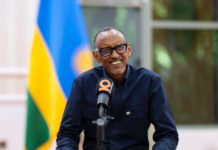As some of the Rwandan Special Forces that have been operating in Eastern DRC have been returned to Rwanda, a debate between the DRC and the Rwandan governments has been raging around the following question: were the Rwandan Special Forces invited into the DRC by Congolese President Joseph Kabila?
Congolese Communications Minister Lambert Mende Omalanga categorically denies the assertion. Rwandan officials, especially the Defense Minister General James Kabarebe, affirm the contrary and state that the Rwandan Special Forces were invited by DRC government in January -February 2009 and that there is a secret accord signed between Rwandan and Congolese top officials. Who is right?
AfroAmerica Network has been in possession since February 7, 2009 of a copy of the Secret Accord signed at the Serena Hotel, Rubavu, Western Province, Rwanda on February 6, 2009 between the DRC and Rwanda governments.
AfroAmerica Network obtained the copy through three independent sources: one within the Rwandan Government, another within the Congolese Government, and a third that we choose to not disclose.
The Secret Accord, specifically in paragraph 8, indicates that the Rwandan Special Forces working with FARDC were allowed to enter the DRC territory to target Rwandan refugees, labelled “ex-FAR/Interahamwe” in the accord, and repatriate them “peacefully or forcefully, instead of allowing them to resettle on the DRC territory.”
The Accord was signed when a group of Rwandan refugees had been disarmed and regrouped in Kasiki, Lubero territory, North-Kivu, by the National Democratic Congress (NDC), an umbrella of Rwandan rebel groups, within the framework of what is called Kisangani/Rome process. The Kisangani/Rome process had resulted from negotiations between DRC Government and NDC, under the mediation of Sant’Egidio Community, Eglise du Christ au Congo (ECC) and SIK-Norway.
Three days after the Secret Accord was signed, the Rwandan Special Forces attacked the disarmed Rwandan refugees in Kasiki, hence putting an end to the process.
Therefore, in this case, Joseph Kabila’s government is lying and the Rwandan government is right.
What is appalling is that Joseph Kabila’s goverment signed the Secret Agreement to bring in Rwandan Special Forces, while negotiating with NDC to disarm and regroup refugees, who included women, children and elderly. Did President Joseph Kabila seek to have the refugees regrouped and at the same sign a Secret Accord to have Rwandan Special Forces to attack these refugees? Only he and his confidents, especially the head of Military Intelligence Colonel Yav, Joseph Kabila’s right and left arms, the now disgraced General John Numbi and the late Katumba Mwanke, the Security Advisor at the time Professor Kaumba and his representatives in the Kisangani/Rome process, Ambassador Seraphin Ngwej and Bishop Dr. Kuye Ndondo.
What Joseph Kabila and his government cannot hide is the Secret Accord of which AfroAmerica Network has a copy. It would not be surprising that Minister Mr. Lambert Mende himself or Raymond Tshibanda may not be aware of the Secret Agreement: they were not involved in the process.
In fact this is how paragraph one of the Secret Accord starts (original in French, use a translator for English):
“1. Les Délégations de la République du Rwanda et de la République Démocratique du Congo, conduites respectivement par S.E. Rose Marie MUSEMINALI et S.E. Alexis THAMBWE MWAMBA, respectivement Ministre des Affaires Etrangeres du Rwanda et de la République Démocratique du Congo, se sont rencontrés du 5 au 6 février 2009 à l’hotel Lake Kivu Serena à Rubavu dans la Province de l’Ouest en République du Rwanda.”
Now the questions remains:
1) Why did Kabila sign the Secret Accord while Rwandan refugees were seeking to repatriate and in negotiations with his government?
2) Why was the DRC government not informed of the content of the Secret Accord?
3) Why is the DRC government denying the existence of the Secret Accord?
4) Why is not the Rwandan government publishing the Secret Accord to counter the denials by the DRC government?
The secret may lie on the potential war crimes committed by the Rwandan Special Forces under the terms of the accord: the attack of unarmed refugees regrouped in Kasiki on February 9, 2009, three days after the signature of the Secret Accord.






























































Of course Kigali cannot publish the secret accord if its aim was to attack the disarmed refugees instead of negotiating with them.If there is no FDLR in Congo Kigali will not have access to minerals so the statuquo must remain that why kigali is not willing to dialogue with its refugees…